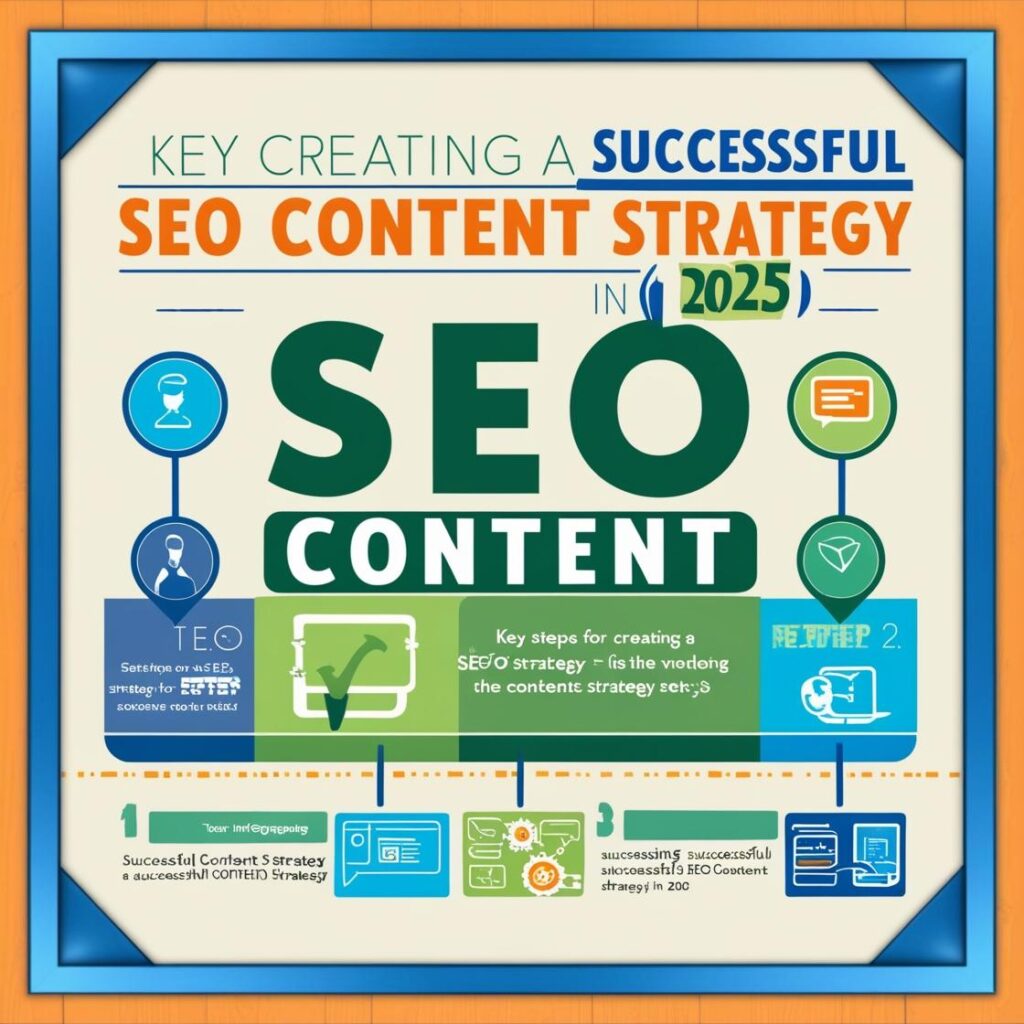Introduction
What is an SEO content strategy? An SEO content strategy is your roadmap to creating, optimizing, and managing content that ranks well on search engines. It helps attract the right audience and drive organic traffic to your website. With an effective plan, you can ensure your content aligns with what users are searching for.
Why AI is Changing the Game in 2025 Fast forward to 2025, and AI has revolutionized how we approach SEO. From predictive analytics to automated content creation, AI tools make crafting an effective strategy faster and smarter. Imagine having a virtual assistant that can predict trends and optimize content in real time—that’s the power of AI!

Understanding SEO in 2025
Evolution of SEO Practices SEO isn’t what it used to be. Gone are the days of keyword stuffing and link farming. In 2025, it’s all about user intent, voice search, and AI-driven algorithms. Search engines now prioritize user experience, so your content must be relevant, fast, and mobile-friendly.
The Role of AI in Modern SEO AI is the backbone of SEO in 2025. Tools powered by machine learning analyze massive datasets to uncover insights you might miss manually. Think of AI as your co-pilot, helping you navigate the ever-changing SEO landscape.
Benefits of Using AI for SEO Content Strategy
Time Efficiency One of the biggest advantages of AI is its ability to save time. Tasks like keyword research, competitor analysis, and content optimization, which used to take hours, can now be done in minutes.
Data-Driven Insights AI doesn’t just gather data; it makes sense of it. By analyzing patterns and trends, AI helps you make informed decisions about what content to create and how to optimize it for maximum impact.
Tools for AI-Powered SEO
AI-Based Keyword Research Tools Platforms like SEMrush, Ahrefs, and newer AI tools like Surfer SEO use machine learning to identify keywords with high potential. They provide suggestions based on search trends, competition, and user intent.
AI Content Optimization Platforms Tools like Clearscope and MarketMuse analyze your content and compare it against top-ranking pages. They highlight gaps and recommend improvements to ensure your content outperforms competitors.
- Skills for the Future Level Up Your Life
- Future-Proof Your Career: 10 Skills to Master in 2025
- From Home Office to Big Profit: Top Remote Jobs That Pay Well
- 20 Side Hustles You Can Start Today to Make Money Online
- Freelance Your Way to Success: Top Online Gigs for Extra Income
- How to Turn Your Hobbies into an Income Stream Online
- Monetag: The Best Alternative to Google AdSense
- How to Start a Successful Blog That Actually Makes Money
- From Home Office to Big Profit: Top Remote Jobs That Pay Well
Steps to Develop an SEO Content Strategy Using AI
Step 1 – Define Your Goals
Setting Clear Objectives Before diving into the technical stuff, know what you’re aiming for. Do you want more traffic? Better engagement? Increased conversions? Your goals should be specific, measurable, achievable, relevant, and time-bound (SMART).
Aligning Goals with Business Needs Make sure your SEO goals align with your broader business objectives. For instance, if you’re launching a new product, your content should focus on educating users and driving interest.
Step 2 – Perform Keyword Research
Using AI for Long-Tail Keywords Long-tail keywords are goldmines for SEO. AI tools can identify these keywords by analyzing user behavior and search intent. These less competitive keywords often bring in highly targeted traffic.
Analyzing Competitor Keywords With AI, you can spy on your competitors. Tools like SpyFu and SEMrush reveal what keywords your competitors are ranking for, giving you a competitive edge.
Step 3 – Create a Content Calendar
Planning with AI AI tools like Notion and Trello (with integrations) can help you organize and plan your content calendar. They even suggest optimal publishing times based on analytics.
Prioritizing High-Value Topics Focus on topics that align with user intent and have high search volume. AI prioritizes topics based on potential ROI, saving you from guesswork.
Step 4 – Generate High-Quality Content
AI Content Generators AI-powered platforms like Jasper and ChatGPT can draft articles, generate headlines, and even suggest visuals. But remember, AI isn’t perfect—you’ll still need to fine-tune the content.
Human Touch for Personalization While AI can churn out content quickly, adding a human touch ensures it resonates with your audience. Your unique voice is what sets your content apart.
Step 5 – Optimize Content for Search Engines
AI Tools for SEO Optimization From meta tags to readability, tools like Yoast and Rank Math ensure your content is search-engine-friendly. They’ll flag errors and suggest fixes, saving you tons of effort.
Incorporating User Intent Understanding why users search for something helps you create content that answers their questions. AI deciphers user intent and ensures your content aligns perfectly.
Step 6 – Monitor and Refine
AI Analytics Tools Platforms like Google Analytics and AI-powered dashboards provide real-time insights into your strategy’s performance. Track metrics like traffic, bounce rates, and conversions to see what’s working.
Continuous Improvement SEO isn’t set-it-and-forget-it. AI tools offer suggestions for improvement based on changing trends and data.
Common Mistakes to Avoid
Over-Reliance on AI AI is a tool, not a replacement for creativity. Over-relying on AI can lead to generic content that fails to connect with readers.
Ignoring the Human Factor Search engines value authenticity. Balance AI efficiency with human creativity to ensure your content remains engaging and unique.
Measuring the Success of Your SEO Strategy
Key Metrics to Track Focus on metrics like organic traffic, bounce rate, and keyword rankings. These numbers tell you how well your strategy is performing.
Tools for Performance Analysis AI-powered tools like Tableau and Power BI visualize your data, making it easier to identify trends and areas for improvement.
The Future of AI in SEO
Emerging Trends From voice search optimization to predictive analytics, AI is set to make SEO more dynamic than ever. Expect smarter algorithms and more personalized search experiences.
Predictions for 2030 Looking ahead, AI might fully integrate with AR/VR, providing immersive search experiences. The possibilities are endless!
Conclusion
In 2025, creating an SEO content strategy using AI isn’t just smart; it’s necessary. From keyword research to analytics, AI streamlines the process and boosts efficiency. But remember, the human touch is irreplaceable. Combine AI’s power with your creativity, and you’ll craft a strategy that delivers results. So, why wait? Start leveraging AI today to stay ahead in the SEO game.
